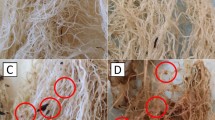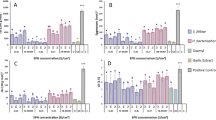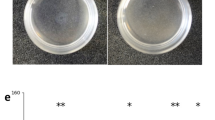Abstract
PLANTS of Sorghum vulgare, variety Radar (a variety of sorghum developed in South Africa), were collected on a farm in the Vryburg District, Cape Province. The land had for a number of years previously been planted only to maize and sorghum. The roots of the plants collected were found to be galled, the galling being caused by a root-knot nematode the morphology and pathological behaviour of which reveal it to be a new species. The name Meloidogyne acronea is proposed for this species.
This is a preview of subscription content, access via your institution
Access options
Subscribe to this journal
Receive 51 print issues and online access
$199.00 per year
only $3.90 per issue
Buy this article
- Purchase on Springer Link
- Instant access to full article PDF
Prices may be subject to local taxes which are calculated during checkout
Similar content being viewed by others
References
Chitwood, B. G., Proc. Helminth. Soc. Wash., 16, (2), 90 (1949).
Author information
Authors and Affiliations
Rights and permissions
About this article
Cite this article
COETZEE, V. Meloidogyne acronea, a New Species of Root-Knot Nematode. Nature 177, 899–900 (1956). https://doi.org/10.1038/177899a0
Issue Date:
DOI: https://doi.org/10.1038/177899a0
This article is cited by
-
Integrative Taxonomy of Meloidogyne oryzae (Nematoda: Meloidogyninae) parasitizing rice crops in Southern Brazil
European Journal of Plant Pathology (2018)
Comments
By submitting a comment you agree to abide by our Terms and Community Guidelines. If you find something abusive or that does not comply with our terms or guidelines please flag it as inappropriate.



